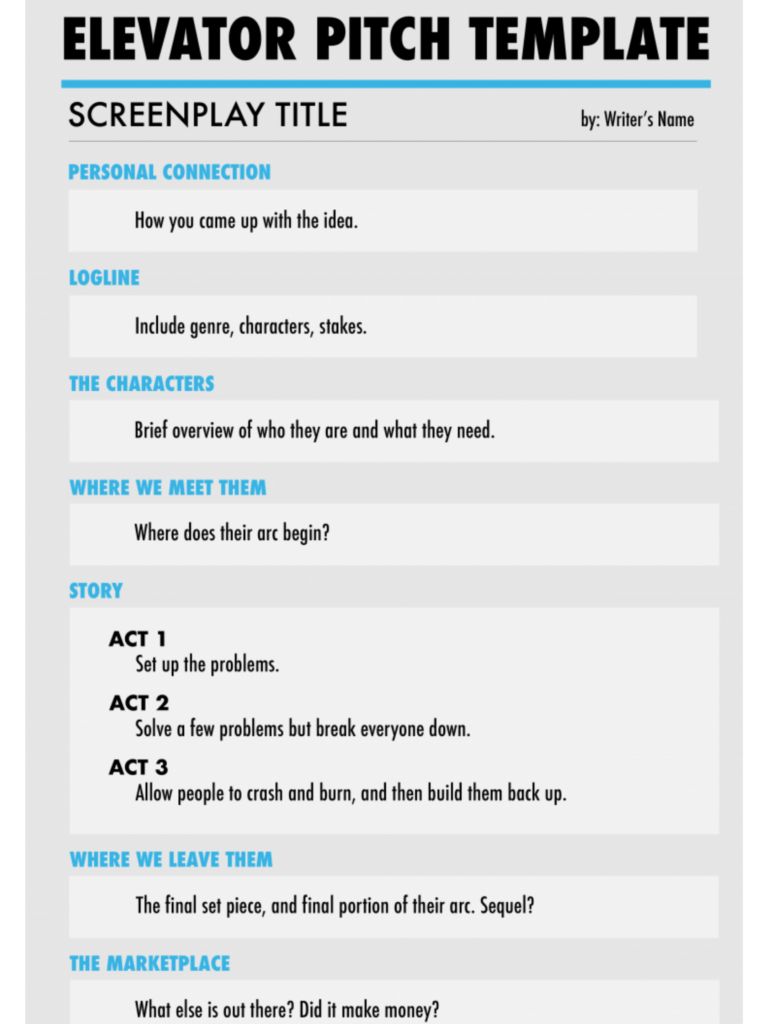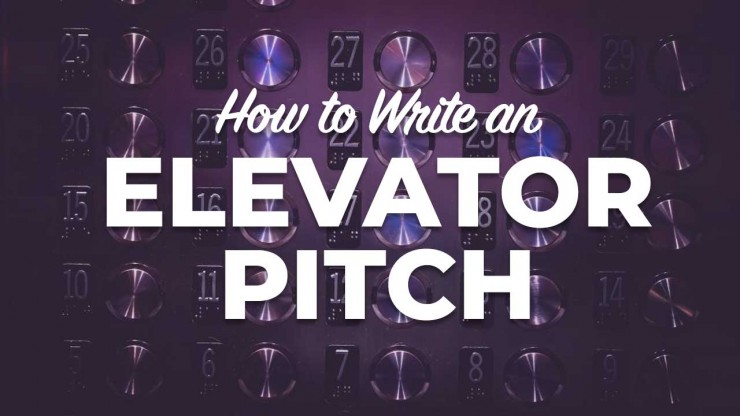A well-crafted elevator pitch is essential for any screenwriter. Whether you’re pitching to a producer or director, or simply trying to get your script read, a good elevator pitch will capture the essence of your story and leave the listener wanting more. In this blog post, we’ll provide some examples of effective elevator pitches to help students understand what makes a great one. We’ll also discuss the key elements of an elevator pitch and how to craft one that stands out from the rest. So if you’re interested in learning how to sell your screenplay effectively, keep reading to see what elevator pitch examples for students should look like!
What Is An Elevator Pitch?
Elevator pitches are a quick way to sell your script or project in a short amount of time. For elevator pitch examples, look no further than some of the most successful elevator pitches in history. Remember, an elevator pitch is all about distilling your idea down to its core essence and making it irresistible to the listener. So without further ado, here are 10 elevator pitch examples for students.
Elevator Pitch Examples for Students
example #1: “Back to the Future” – In this classic 1980s film, a young man is accidentally sent back in time and must find a way to return to the present before it’s too late.
example #2: “The Shawshank Redemption” – This 1994 film tells the story of a man wrongly convicted of murder who finds hope and friendship in the unlikeliest of places – the maximum security prison he’s been sentenced to.
example #3: “Forrest Gump” – This 1990s film follows the life of an unlikely hero who manages to be at the center of some of the most important events of his time.
example #4: “The Dark Knight” – This 2008 blockbuster tells the story of Batman’s battle against The Joker, one of his most dangerous enemies.
example #5: “The Godfather” – This 1972 classic follows the Corleone crime family as they navigate their way through the treacherous world of organized crime.
example #6: “Pulp Fiction” – This 1993 cult classic tells interconnected stories about criminals, mobsters, and other characters living in Los Angeles’ seedy underbelly.
example #7: “The Silence of the Lambs” – This 1991 thriller follows an FBI trainee as she tracks down a serial killer known as Hannibal Lecter.
example #8: “Jaws” – This timeless 1975 thriller follows a small town’s battle against a great white shark that’s terrorizing their waters.
example #9: E.T. – In this heartwarming 1982 film, a boy befriends an alien who’s stranded on Earth and tries to help him get back home.
example #10: Star Wars – This iconic 1977 film tells the story of Luke Skywalker as he joins forces with Obi-Wan Kenobi, Princess Leia, and Han Solo to save the galaxy from Darth Vader and the Empire’s evil forces.
These are just a few elevator pitch examples for students that have worked like a charm. So if you’re ever stuck on how to distill your own project down to its key elements, remember to keep it simple and make it unforgettable.
What Makes a Great Elevator Pitch?
A great elevator pitch for a screenplay should be concise, memorable, and informative. It should give the listener a clear idea of what the screenplay is about, without getting bogged down in too much detail. The elevator pitch should also be delivered with enthusiasm and conviction, in order to capture the listener’s attention and interest.
One way to ensure that your elevator pitch is effective is to practice it beforehand. This will help you to refine your delivery and ensure that you hit all of the key points that you want to make. Additionally, it can be helpful to have an elevator pitch example available to study and learn from. By taking the time to prepare your elevator pitch, you can increase your chances of impressing potential investors and getting your screenplay funded.
Key Elements of a Great Elevator Pitch
A great elevator pitch should be no more than two minutes long and should include the following elements:
- The logline: This is a one-sentence summary of the plot that grabs the listener’s attention.
- The elevator pitch: This is a brief description of the story that explains the main conflict and sets up the stakes.
- The characters: Introduce the main characters and describe their motivation for pursuing the goal.
- The setting: Describe the location where the story takes place and how it contributes to the conflict.
- The conflict: Explain what the characters are fighting against and why it is important for them to win.
- The climax: Describe how the conflict is resolved and what happened as a result.
- The theme: Explain what larger issue the story is exploring and how it relates to the characters’ journey.
- The takeaway: Summarize what the audience will learn from watching the story unfold.
- The call to action: Ask the listener to take some kind of action, such as investing in the project or telling others about it.
How To Craft an Elevator Pitch
Here are 15 tips to craft an elevator pitch for your screenplay:
- Start with a logline. This is a one-sentence summary of your story that should give the listener a clear idea of what your screenplay is about.
- Keep it short. elevator pitches should be no more than two minutes long, so make every word count.
- Know your audience. Before you start pitching, find out as much as you can about the person or people you’re pitching to. This will help you tailor your elevator pitch to their specific needs and interests.
- Be clear and concise. Don’t try to fit too much information into your elevator pitch – stick to the essentials and leave out any unnecessary details.
- Make it engaging. Just like any other type of sales pitch, an elevator pitch needs to be interesting and engaging if you want people to sit up and take notice.
- Have a strong opening. The first few seconds of your elevator pitch are crucial in catching the listener’s attention, so make sure you start strong.
- Highlight the key points. Identify the key elements of your story and make sure they are included in your elevator pitch.
- Focus on the conflict. What obstacle is your protagonist facing and how do they overcome it? This is what will keep listeners hooked until the very end.
- Use descriptive language. Make sure your elevator pitch paints a picture in the listener’s mind that they won’t soon forget.
- Be Passionate. If you’re not passionate about your story, then why should anyone else be? Let your love for your project shine through in your elevator pitch and you’re sure to win people over.
- Avoid technical jargon .Unless you’re pitching to someone who already knows about screenwriting, avoid using any industry-specific terms or acronyms that they might not understand.
- Rehearse, rehearse, rehearse .You only get one chance to make a first impression, so it’s important that you rehearse your elevator pitch until you have it down pat.
- Be prepared for questions .Once you’ve delivered your elevator pitch , be prepared for questions from the listener . They may want clarification on certain points or they may have follow- up questions , so make sure you’re ready with answers.
- Don’t rush it .Even if you’ve rehearsed multiple times , don’t try to speed through your elevator pitch just to get it over with . Speak slowly and clearly , taking pauses where necessary , so that everything comes across loud and clear.
- Follow up afterwards .Once you’re done pitching , don’t just walk away ! Thank the person for their time and offer them additional information if they’re interested . You can also give them your contact details in case they want to get in touch at a later date.
Skills Needed For Elevator Pitch
When it comes to elevator pitches, there are a few key skills you need to master in order to be successful. First, you need to be able to identify the key elements of your story that will sell it to an audience. Second, you need to be able to distill those key elements into a brief but compelling pitch that can be delivered in the time it takes to ride an elevator. And third, you need to be able to deliver your pitch with confidence and enthusiasm.
While there is no one perfect formula for crafting an elevator pitch, there are a few things you can do to increase your chances of success. First, start by identifying the genre and target audience for your screenplay. Then, focus on the key plot points and themes that will resonate with that audience. Finally, practice delivering your elevator pitch until you can do so with confidence and clarity. By following these steps, you can make sure that your elevator pitch makes a positive impression on industry professionals and sets you up for success.
It’s This Meets That
It can be helpful to think of an elevator pitch as a “this meets that” statement. For example, if you’re pitching a romantic comedy, you might say something like “It’s When Harry Met Sally meets The Office.” In other words, you’re taking two familiar properties and using them to explain what your screenplay is all about. Of course, you don’t want to simply regurgitate the plot of those two films; rather, you want to use them as a way to highlight the unique elements of your own story. But if you can find a way to succinctly and cleverly compare your screenplay to other well-known properties, you’ll have a much better chance of catching people’s attention and getting them interested in reading more.
Know Your Hook
When it comes to selling your screenplay, you need to be able to deliver a strong elevator pitch. An elevator pitch is a brief summary of your story that should be no longer than two minutes. The goal is to hook the listener and get them interested in learning more about your story. So how do you craft a successful elevator pitch? First, you need to know your hook. What is the unique element of your story that will grab the listener’s attention? Once you have identified your hook, you can start to craft your elevator pitch around it. Here are a few elevator pitch examples for students:
- “My script is a coming-of-age story about a teenage girl who discovers she has superpowers.”
- “My script is a horror movie about a group of friends who get stranded in a haunted house.”
- “My script is a romantic comedy about two people who meet on a dating app.”
Once you have your hook, you need to be able to articulate it in a clear and concise way. Remember, you only have two minutes, so make every word count. When pitching your story, be sure to include the genre, the main character, and the conflict. And most importantly, don’t forget to be enthusiastic! If you can convey your passion for your story, you’ll be one step closer to getting that sale.

Related:


Leave a Reply